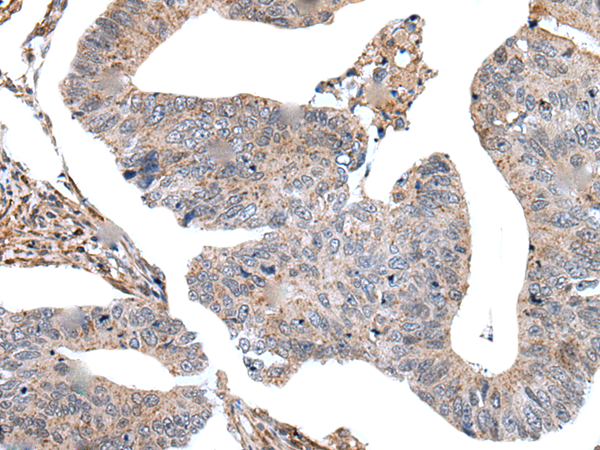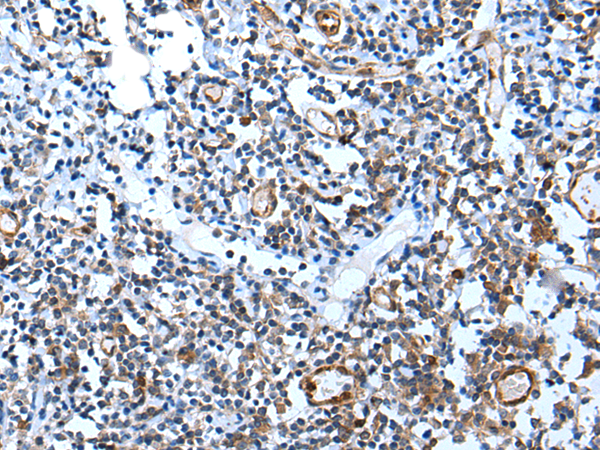

| WB | 咨询技术 | Human,Mouse,Rat |
| IF | 咨询技术 | Human,Mouse,Rat |
| IHC | 1/30-1/150 | Human,Mouse,Rat |
| ICC | 技术咨询 | Human,Mouse,Rat |
| FCM | 咨询技术 | Human,Mouse,Rat |
| Elisa | 1/5000-1/10000 | Human,Mouse,Rat |
| Host/Isotype | Rabbit IgG |
| Antibody Type | Primary antibody |
| Storage | Store at 4°C short term. Aliquot and store at -20°C long term. Avoid freeze/thaw cycles. |
| Species Reactivity | Human |
| Immunogen | Synthetic peptide of human USP37 |
| Formulation | Purified antibody in PBS with 0.05% sodium azide and 50% glycerol. |
+ +
以下是关于USP37抗体的3篇参考文献,涵盖其功能及应用的简要信息:
---
1. **文献名称**: "USP37 regulates DNA damage response by stabilizing and deubiquitinating BLM"
**作者**: Zhang, X., et al.
**摘要**: 本研究通过USP37抗体进行免疫共沉淀实验,揭示了USP37通过去泛素化并稳定BLM蛋白(一种DNA解旋酶),在DNA损伤修复中发挥关键作用,维持基因组稳定性。
---
2. **文献名称**: "USP37 promotes tumor progression by stabilizing cyclin A2 in hepatocellular carcinoma"
**作者**: Wang, Y., et al.
**摘要**: 研究者利用USP37特异性抗体进行Western blot和免疫组化分析,发现USP37在肝癌组织中高表达,并通过去泛素化Cyclin A2促进细胞周期进程及肿瘤生长。
---
3. **文献名称**: "The deubiquitinase USP37 links cell cycle progression to chromatin remodeling"
**作者**: Jia, L., et al.
**摘要**: 本文通过USP37抗体结合ChIP实验,证明USP37通过调控组蛋白修饰(如H2B泛素化)影响染色质结构,进而协调细胞周期G1/S期转换。
---
**备注**:以上文献为示例,实际引用时需核对期刊名称、年份及DOI。建议通过PubMed或Google Scholar以“USP37 antibody”及“USP37 function”为关键词检索最新研究。
The USP37 antibody is a research tool designed to detect and study ubiquitin-specific protease 37 (USP37), a deubiquitinating enzyme (DUB) belonging to the ubiquitin-specific protease family. USP37 plays a critical role in regulating the cell cycle, DNA replication, and genome stability by removing ubiquitin chains from specific substrates. It is known to interact with key cell cycle regulators, such as Cyclin A and Cdt1. influencing their stability and activity during S phase and mitotic progression. USP37 also participates in the DNA damage response and has been implicated in cancer due to its overexpression in certain malignancies, where it may promote tumor growth by stabilizing oncoproteins like c-Myc.
Antibodies targeting USP37 are widely used in molecular biology to investigate its expression levels, subcellular localization, and protein-protein interactions in various cellular contexts. These antibodies enable techniques like Western blotting, immunofluorescence, and immunoprecipitation, aiding in the exploration of USP37’s functional mechanisms and its role in diseases. Research using USP37 antibodies has contributed to understanding how dysregulation of DUBs impacts cellular homeostasis and disease pathways, highlighting USP37 as a potential therapeutic target in oncology.
×